Unconventional #24: How the GOP could ‘Dump Trump’ in Cleveland (and more!)
1. Step-by-step instructions: How the GOP could ‘Dump Trump’ in Cleveland
Do we think that the Republican Party will ditch presumptive nominee Donald Trump at its convention in July and select someone else to replace him — a notion that seems to be catching on among conservatives and commentators in the wake of Trump’s controversial remarks about the Mexican-American judge overseeing his Trump University suit?
No, we do not.
And yet, if there were ever an election weird and wild enough to make such a switcheroo possible — just barely — 2016 would be it.
Cleveland is a long way away. A lot can happen between now and then.
So what would have to happen to make “Dump Trump” a reality?
To give our fellow convention fanatics something to fantasize about for the next 40 days, Unconventional has assembled a step-by-step instruction manual for dumping Trump. If any of these steps are skipped, the whole chain reaction fizzles out. But if every one of them is completed, there is still a chance — a very, very slim chance — that Donald Trump won’t be competing against Hillary Clinton in fall.
Step One: Trump keeps saying offensive stuff
Trump has said plenty of objectionable things since launching his campaign last summer: the Mexicans-are-rapists thing, the John-McCain-isn’t-a-war-hero thing, the Muslims-should-be-barred-from-entering-the-U.S. thing, and so on.
But the Judge Curiel-can’t-do-his-job-because-he’s-of-Mexican descent thing is the first toxic thing that Trump has said since becoming the GOP’s presumptive nominee. The content may be similar, but the context is very different. Before, during the primaries, Republican leaders could brush off Trump’s remarks. He’s not my candidate, they could say. Maybe the voters will still reject him. And if not, he’ll probably grow up in time for the general.
Back then, Trump didn’t represent the GOP. Now he does. So now whenever Trump says something offensive, other Republicans have to choose: Do I defend this? Or do I denounce it? Hiding isn’t an option anymore.
As we’ve seen over the last week, the risk of guilt by association has dramatically lowered the GOP’s tolerance for Trump’s most distasteful remarks.
“ ‘Bigot, bigot, bigot. Racist. Racist Racist,’ ” said influential conservative talk-radio host Hugh Hewitt Wednesday, recapping the morning’s headlines. “The Republican National Committee needs to step in and step up, and go see Donald Trump and tell him to get out of the race.”
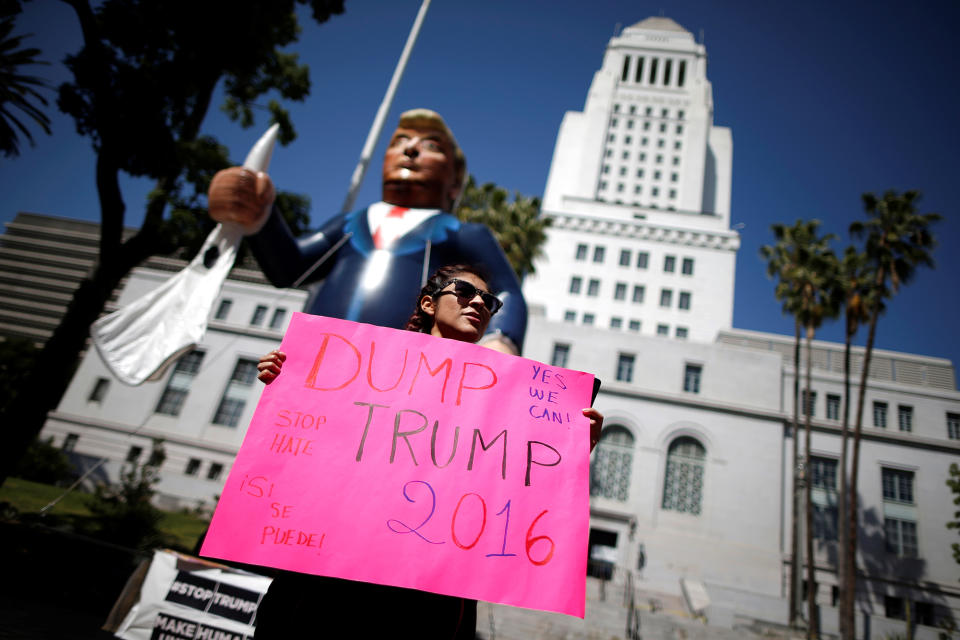
Hewitt’s alarmism aside, Trump can probably recover from a single Curiel-style controversy and regain Republican support. But if the sort of pattern he established as one of 17 primary candidates continues now that he’s the presumptive nominee — if this sort of incident happens again and again — more and more Republicans will decide that the only way they can salvage their own reputations is by distancing themselves from the guy at the top of the ticket.
Step Two: Trump’s poll numbers plummet
Right now, Trump is trailing Clinton by only 3.8 percentage points, on average, in the general-election polls. That’s reasonable. To be expected. He’s still “well within striking distance,” as they say.
But what happens if Trump’s numbers go into a free fall and Clinton starts to pull away? What if she crosses the 50-percent threshold and he plunges into the 30s? What if the gap between them widens — to five points, 10 points, 15 points?
This is key. The major problem with dumping Trump is political. It looks like GOP elites are conspiring to deny the will of GOP voters — the most galling offense imaginable in a year that’s been all about the voters denying the will of the elites.
But Trump’s plummeting poll numbers would provide objective evidence that actual voters agree with party leaders that he’s gone too far. The GOP would start to fear a down-ballot disaster. More Republicans would jump ship. Combined with a series of Curiel-like controversies, a sickening slide in Trump’s public-opinion stats might establish a new anti-Trump argument that doesn’t ask rank-and-file Republicans to reject the nominee just because establishment types like Mitt Romney and Marco Rubio are doing it: Trump had his chance. Now he’s tanking — and he’s taking the party with him.
Step Three: Someone else steps up
Mitt Romney refused. Ben Sasse begged off. James Mattis said no sir. Even David French — a bald, bearded conservative lawyer that no one had ever heard of — decided against it.
You can’t fault the #NeverTrump movement for lack of effort. But so far, Weekly Standard Editor Bill Kristol and his anti-Donald cronies have been unable to convince anybody to take on Trump.
For the whole “Dump Trump” scheme to work, this would have to change.
As Curly Haugland, a member of the convention Rules Committee from North Dakota, recently told the New York Times, “In order to have a contested convention, we need to have contestants.”
Some Republican politicians are starting to signal their interest in a convention challenge. As Yahoo Senior Political Correspondent Jon Ward reported earlier this week, conservatives are increasingly mentioning Wisconsin Gov. Scott Walker as a “possible replacement.” RedState reported Wednesday that there are “rumors” that Walker is “open” to such an outcome. One of Ward’s sources said that Walker, who mounted a brief bid for the 2016 GOP nomination, has told those working to find an alternative that he would be willing to step up at the convention if Trump continues to implode.
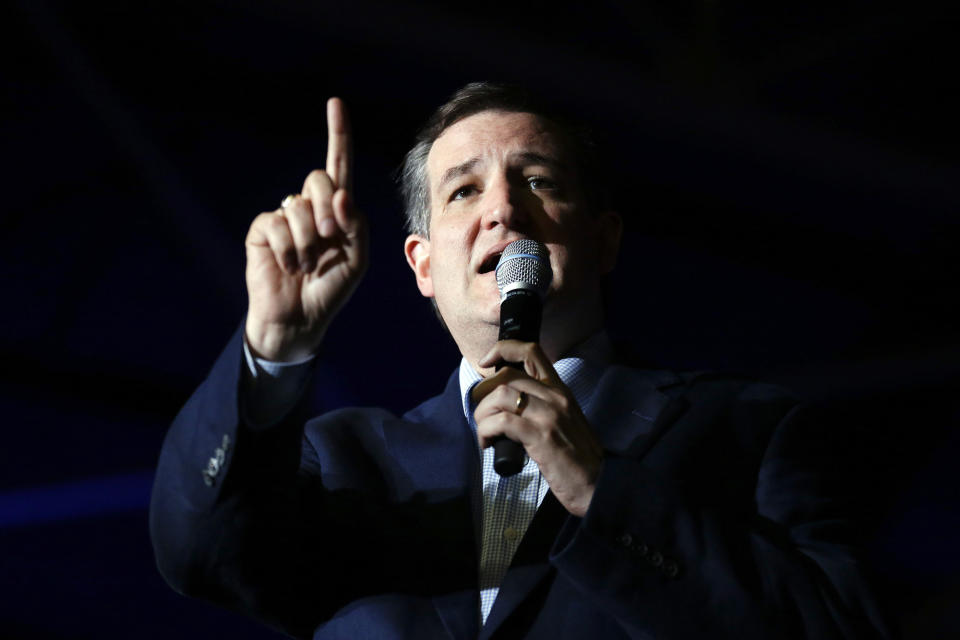
The likeliest substitute, however, would be someone who can already claim considerable support among the convention delegates. Ted Cruz comes to mind. Right now, he has 559 delegates to Trump’s 1,542. But remember: Many of the delegates now pledged to Trump were loyal to Cruz (or some other candidate) first.
For his part, Cruz has kept his options open, refusing to endorse Trump and suggesting that if he sees “a viable path to victory” in the future, he “will certainly respond accordingly.”
“I am looking and listening and watching the candidates,” Cruz told CNN earlier this week. “I’m doing the same thing millions of voters are doing and … time will tell.”
Step Four: Republicans rewrite the rules.
Now for the fun part.
Everybody thinks that 1,542 convention delegates are bound to vote for Trump on at least the first ballot. But that isn’t exactly true. The reality is that every convention passes its own rules, and with the exception of 1976, no GOP convention has ever voted to bind its delegates. They’re technically free to vote for whomever they want: Trump, Cruz, Walker, Mickey Mouse. If you’re curious, we’ve already explained this issue at length.
The problem is that various state rules and laws purport to bind the delegates — and the delegates will be loath to defy the directives of the 56 states and territories that sent them to Cleveland.
Fortunately for the Dump Trump dreamers, they don’t have to. All the delegates have to do is revise convention Rules 40(d) and (e) — the rules that say how many of their votes are required to win the nomination.
Currently, a simple majority will cut it: 50 percent plus one. But the convention could lift that threshold to 60 percent for the first ballot. Or 66.6 percent, which is where the Democratic Party set its bar for more than a hundred years, from 1832 to 1936. In that case, the delegates wouldn’t have to violate the state rules designed to bind them for a certain number of ballots — but Trump would no longer be assured the nomination.
Republicans aren’t desperate enough to do this yet. But imagine if they already had steps one, two and three under their belt. By then, the Rules Committee, the delegates and even many Trump supporters would likely be looking for a way out. Rewriting the rules would be their last chance.
_____
2. Sanders keeps campaigning in D.C., but supporters lament the end
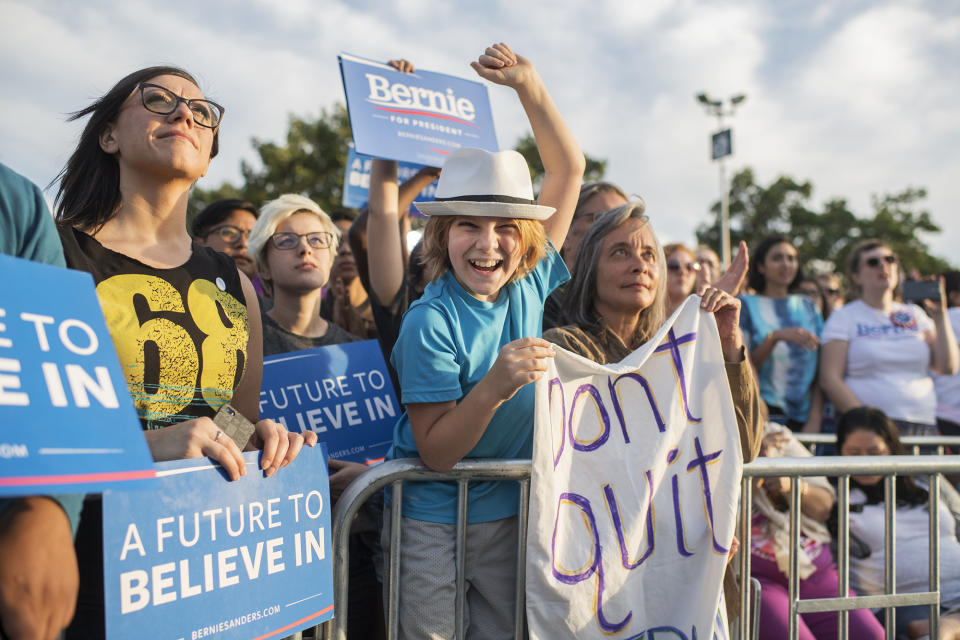
By Jon Ward
WASHINGTON, D.C. — Bernie Sanders ignored the approaching end of his presidential candidacy Thursday evening at an outdoor rally in the nation’s capital, seeking to maintain political leverage in the run-up to the Democratic convention in July.
But the 74-year-old Democratic presidential candidate signaled earlier in the day that he while he seeks to move the Democratic Party left at the convention, he will not undercut presumptive Democratic nominee Hillary Clinton as she moves toward a general-election matchup with presumptive Republican nominee Donald Trump.
Sanders spoke for an hour to 3,000 supporters at a skate park next to RFK Stadium — the former home field of the NFL’s Washington Redskins — and made no mention of Clinton or of the fact that President Obama had endorsed her candidacy earlier in the day.
(Read the full version of this story here.)
Around the time that Sanders arrived at the evening rally, news broke that Sen. Elizabeth Warren of Massachusetts, a favorite of progressives, was set to endorse Clinton as well.
Sanders opened his remarks by thanking the crowd for “being part of a political revolution.”
The crowd responded with chants of “Thank you, Bernie!”
It was the closest that the 74-year-old Democratic Socialist came to publicly acknowledging the inevitable end of his candidacy, after Clinton crossed the delegate threshold needed to clinch the nomination earlier this week.
A moment later, Sanders noted that pundits had predicted his campaign would not last long, and said, “Well, here we are — it’s mid-June, and we’re still standing.”
Sanders said that the final results from the California primary on Tuesday had yet to come in. And he ended by asking the crowd to vote for him in next Tuesday’s D.C. primary election, which will mark the end of the primary process.
But after a meeting with Senate Minority Leader Harry Reid earlier in the day, Reid told reporters that Sanders seemed to have “accepted” that he would not be the nominee.
Sanders also met with Obama at the White House Thursday. Afterward he told reporters that he would meet with Clinton “in the near future to see how we can work together to defeat Donald Trump and to create a government which represents all of us and not just the 1 percent.”
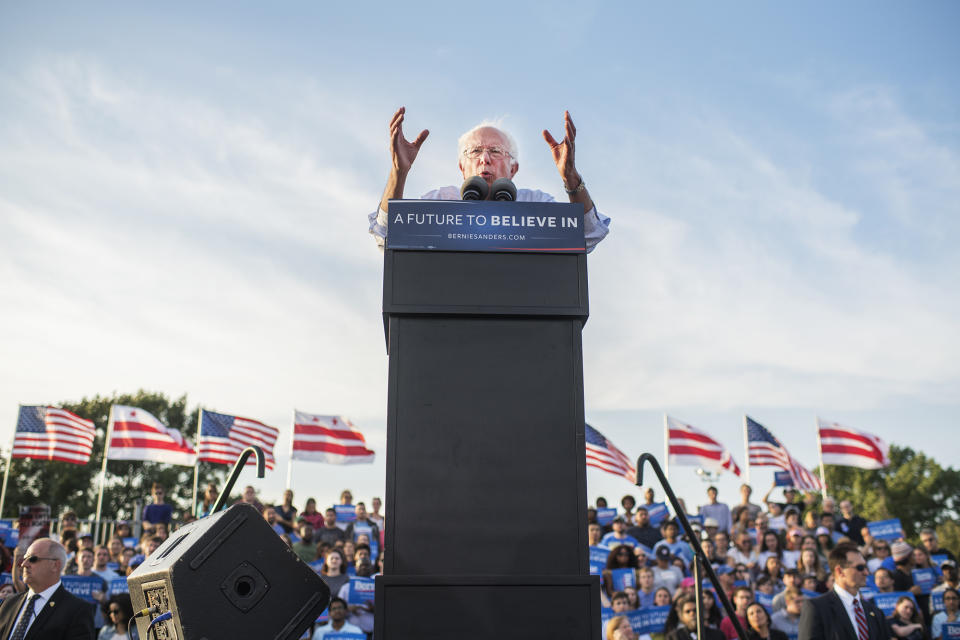
Sanders pledged to “work as hard as I can to make sure that Donald Trump does not become president of the United States.”
The Sanders supporters who introduced him to the crowd at the evening rally were more transparent.
“These last few days have been difficult. … I’ve had to go into my hotel room and just hold on,” said Native American tribal rights leader Deborah Parker.
And philosophy professor Cornel West urged the crowd to “never allow despair to have the last word.”
West made mention of Clinton and Trump, trashing them both but making it clear that Trump represented a far more unacceptable choice.
“We know that brother Trump is an narcissistic neofascist. Don’t let corporate media convince you that simply because you’re not crazy about the milquetoast neoliberal sister Hillary, there’s something wrong with you,” West said. “We know the difference between a neoliberal and a neofascist, so you make your own decisions.”
Sanders supporters in the crowd were saddened by their preferred candidate’s failure to beat Clinton, but expressed more weary frustration than anger at their options.
“His candidacy has shown the depths of frustration. I’m glad he ran,” said Laura Richards, a longtime D.C. political activist. “Now that this is ending, I guess the feminist civil rights angle is coming out,” she said, referring to Clinton’s historic status as the first woman to be the presumptive presidential nominee of any major political party.
Richards shook her head and added, “I’m not there yet.”
But she did think the majority of Sanders supporters would get over their disappointment and vote for Clinton, in large part because of Trump.
Adam Grachek, a 19-year-old Ohio State student in D.C. for the summer as an intern, said he hoped Sanders would take his candidacy to the convention to make a point and to influence the party’s platform.
“If it was any other Republican,” he said, he would vote for Libertarian candidate Gary Johnson or Jill Stein, the Green Party’s presumptive nominee. But unless the election is a blowout, he said, he will swallow his displeasure with Clinton and vote for her.
“Since it’s Donald Trump, I think the stakes are much higher,” he said. “Donald Trump stands for everything I hate.”
_____
3. The Clinton Veepwatch, Vol. 6: Bernie Sanders
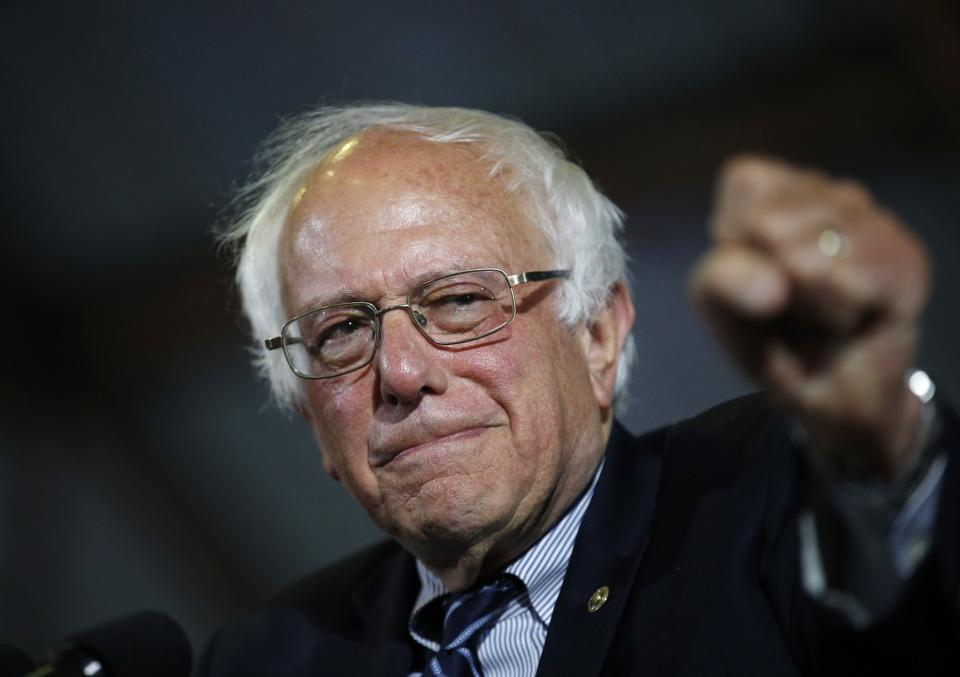
In which Unconventional examines the likely Democratic nominee’s possible — and not-so-possible — vice presidential picks. Previous installments: Elizabeth Warren, Tim Kaine, Mark Cuban, Julián Castro, Sherrod Brown.
Name: Bernard “Bernie” Sanders
Age: 74
Resume: U.S. senator from Vermont; former U.S. congressman; former mayor of Burlington, Vt.
Source of speculation: There comes a time at the end of every contested primary — especially the hard-fought ones that continue until the last day on the calendar — when people start to tout a so-called “dream ticket” (i.e., one that unites the nominee and the runnerup).
This year is no exception.
By “people,” we’re referring to two groups in particular. The first is pundits, who — like Unconventional! — need something (anything) to write about in the weird interregnum between primary season and the fall campaign.
“Mr. Sanders is the perfect antidote to what Mrs. Clinton lacks,” argues Kelly Riddell of The Washington Times. “He inspires, motivates, is trustworthy, and has a base of Democratic support that’s so far eluded her.”
“I have no idea whether Clinton would try to bring Sanders on board,” admits Ryan Cooper of the Week, “but I’d be quite surprised if they weren’t strongly considering it.”
“Laugh at the idea if you want, but don’t rule out a Clinton-Sanders unity ticket just yet,” adds Tessa Stuart of Rolling Stone.
And so on.
The second group gunning for a Clinton-Sanders “team of rivals” is, of course, Sanders supporters. What better way, they figure, for the Vermont senator to keep pushing Hillary to the left than as her vice president?
“I think Bernie and Hillary could be a powerful duo and could bring a lot of Dems together if done right,” says Reddit user stevestgermain.
“There would not be any shame in [that],” offers Arnold Ronald Lamberty on Facebook. “Better to be inside the dragon’s den and work within for progressive advancements and police corporate greed. A case of the best man for the job.”
And so on.
Backstory: While dream tickets make for an entertaining topic of conversation every four years or so, they’re actually quite rare. Since 1960, only three second-place finishers have joined a major-party presidential ticket: Lyndon B. Johnson in 1960, George H.W. Bush in 1980 and John Edwards in 2004.
Sanders seems open to the possibility.
A year ago, before his candidacy really caught on, Sanders was defiant when Yahoo News Global Anchor Katie Couric asked whether he was angling to become Clinton’s running mate.
“No,” Sanders snapped. “My goal is to win this election. … Would she be interested in being my vice president?”
But with the end of the primaries in sight, Sanders’ tone has softened.
“Right now we are focused on the next five weeks of winning the Democratic nomination,” Sanders said when CNN asked about the possibility in May. “If that does not happen, we are going to fight as hard as we can on the floor of the Democratic convention to make sure we have a progressive platform that the American people will support. Then, after that, certainly Secretary Clinton and I can talk and see where to go from there.”
In a subsequent interview with NBC, Sanders added that “’what happens the day after it appears that I am not going to become the nominee, that’s subject for further discussion.”
He has also dismissed the idea of a moderate VP candidate as a “disaster,” and described Clinton’s ideal pick as someone who sounds suspiciously like … well, Bernie Sanders.
“I would hope, if I am not the nominee, that the vice-presidential candidate will not be from Wall Street, will be somebody who has a history of standing up and fighting for working families, taking on the drug companies whose greed is doing so much harm, taking on Wall Street, taking on corporate America, and fighting for a government that works for all of us, not just the 1 percent,” Sanders told NBC’s Chuck Todd in May.
For her part, Clinton hasn’t exactly ruled out running with Sanders. Asked about a dream ticket, she has generally cautioned against “getting ahead of [herself].” But she has also vowed to “unite the party” and promised that “the first person I will call to talk to about where we go and how we get it done will be Senator Sanders.”
“I see a great role and opportunity for him and his supporters to be part of that unified party,” Clinton said in May, “to move into not just November to win the election against Donald Trump, but to then govern based on the progressive goals that he and I share.”
Odds: Sorry, dreamers. It’s never gonna happen.
Let’s keep this short and sweet. The major advantage of Clinton-Sanders pairing is obvious: he brings his disappointed supporters onboard, keeps them from defecting from the Democratic Party, and maximizes progressive turnout in the fall.
But the drawbacks are obvious as well. An endless supply of populist attack lines that Donald Trump can cut into commercials and hang around the ticket’s necks in the fall. Temperament (Sanders is too stubborn and independent to serve smoothly as someone else’s powerless No. 2). Even age (Sanders would be the oldest vice president in U.S. history by several years).
When Clinton refuses to “close the door” on VP Sanders, she’s just being polite. Here’s how she responded to a question earlier this week from Politico about the possibility of Sanders’ fellow progressive darling, Sen. Elizabeth Warren of Massachusetts, joining the ticket:
“I have the highest regard for Sen. Warren. I think she is an incredible public servant, eminently qualified for any role. I look forward to working with her on behalf of not only the campaign and her very effective critique of Trump, but also on the issues that she and I both care about.”
And here’s how Clinton responded to the same reporter’s question about Sanders:
“I think he has contributed greatly to the campaign. His passion for the issues that he promoted has been good for the Democratic party and for the country. I look forward to talking with him when our campaigns can find a time that works with both our schedules.”
One of these statements is in the present tense. The other is mostly in the past tense. In one of them, Clinton “look[s] forward” to “working with” the VP contender “on behalf of not only the campaign … but also on the issues.” In the other, Clinton “look[s] forward to “talking” — when “our campaigns can find a time.”
That tells you everything you need to know.
_____
4. VIDEO: Calm down, Democrats! Gary Hart, the Bernie Sanders of 1984, insists that the Vermont senator can stay in race without hurting Clinton
By Michael Walsh
Former presidential candidate Gary Hart said Thursday that Vermont Sen. Bernie Sanders can stay in the presidential race to “promote the themes and ideas of his candidacy in a positive way that does not deter or undermine Secretary Clinton at all.”
“In fact it could strengthen her,” Hart said. “I think that getting Senator Sanders out of the race is frankly being too heavily promoted by the media.”
Many Democrats have encouraged Sanders to suspend his campaign now that Clinton has enough delegates to clinch the party’s nomination. He’s in a somewhat similar situation to the one Hart found himself in while running for the 1984 Democratic nomination against Walter Mondale.
“If I were in Senator Sanders’ shoes, as I somewhat was many years ago, I would stress the need for the message of economic equality and opportunity [to] be central to the Democratic set of principles in the fall, and I think that’s what he’s doing,” Hart said in conversation with Yahoo National Political Columnist Matt Bai.
Hart, who represented Colorado in the U.S. Senate from 1974–1986, said the media doesn’t always understand that presidential contests are not just about governing but also the direction of a party. He said he insisted in 1984 that Democrats incorporate the ideas he had been talking about into their platform that year — and that those ideas then shaped the direction of the party for years to come.
“I think if anyone writing a PhD thesis or even a master’s thesis would look at that platform, they would see the future of the Democratic Party in it,” Hart said. “In terms of globalization, the information revolution, … military reform and a post-Cold War foreign policy. That was all in the ’84 platform.”
According to Hart, the Democrats have entertained centrism and triangulation to the point that many people do not know what the party stands for anymore. He said Sanders can help clarify the party’s values for voters in a way that does not hurt Clinton.
“Following our convention in San Francisco, which was not divisive at all to my knowledge, I went out in the fall and gave over 50 speeches for Walter Mondale —appeared on the platform with him, introduced him at giant rallies,” Hart said. “That’s when you want the party to be unified.”
_____

5. The best of the rest
@benedettopress Nice piece. If the rest of the press keeps being sore winners you can bet Berners will not vote Clinton.
— UserFrIENDlyyy (@UserFrIENDlyyy) June 10, 2016
NEW overnight — Staff exodus. Senate relationship rebuilding. Full-time pivot to Trump. The Bernie ’16 wind-down: https://t.co/egTlepfyzF
— Gabriel Debenedetti (@gdebenedetti) June 10, 2016
60 GOP governors, senators & representatives are actively holding out on Trump. I analyzed what distinguishes them: https://t.co/gbeDh2pk5t
— Taniel (@Taniel) June 8, 2016
What happens if Trump goes off the rails again? Dumping him at the convention probably impossible. The GOP is stuck. https://t.co/jB9LzDhu12
— Jeremy W. Peters (@jwpetersNYT) June 10, 2016
Not a Single Republican Delegate Is ‘Bound’ to Donald Trump https://t.co/m4O102uADw state laws can’t trump convention rules.
— David French (@DavidAFrench) June 9, 2016
_____
Countdown
For the latest data, make sure to check the Yahoo News delegate scorecard and primary calendar.



